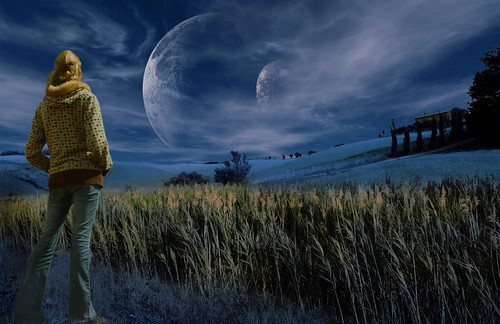Assorted thoughts and reflections on technology in education, and other things ...
Saturday, October 22, 2016
When worlds collide
We live in an age of paradoxes. We have almost instant access to vast amounts of knowledge and information, the ability to share our thoughts and reflections, create global communities of interest and practice and communicate with people anywhere on earth. This should be the most enlightened period in human history. At the same time, in what sometimes seems to be a parallel universe, there seem to be more superstitions, myths and conspiracy theories than ever before and an increasingly popular anti-factual culture that dismisses science, research and education and prefers to believe in sweeping generalisations, lies and half-truths as long as they fit into a convenient narrative.
The digital age has revolutionised the way we live and work and logically should have made us more global, more enlightened and more culturally aware. We generally assume that human history is a development (albeit rather erratic) towards greater democracy, technical and cultural advancement as well as better living standards. Digital technology should logically support this since we can now analyse vast amounts of data that enables us to combat disease, monitor environmental changes and see dangerous trends long before they become major problems. When we comment on conflicts and violence by saying that "xxx shouldn't happen in the 21st century" we assume that our century should be better than its predecessors. Maybe these things happen because we are in the 21st century and modernity should not be seen as synonymous with enlightenment?
I find the filter bubble analogy (Eli Pariser 2011) a recurring theme when discussing all aspects of today's society. Instead of widening our perspectives, the internet is wrapping us in tribal bubbles where we only meet people and information that confirm our own views. We have always formed tribal groupings but the net reinforces this and as a result it becomes almost impossible to discus with someone from another bubble/tribe/planet. The bubble I inhabit is one of global collaboration, democratic development, tolerance and a belief in the common good. We see digital media as a positive force to bring people together, empower them by giving them a voice and where the crowd is always wise. However in a parallel bubble there is a totally alien world where the wisdom of the crowd has become the fury of the mob and the net is an arena for self-promotion, intolerance, mistrust and fear-mongering. There are of course many other bubbles between these extremes but the more we retreat into these cocoons the harder it gets to engage in any kind of communication with representatives of another world whose truths are complete contradictions of those we believe in. The US presidential campaign is a prime example of this but there are similar clashes in almost all countries and the gap seems to be widening.
Another paradox is that all this is happening in an age when more people than ever before have access to free school education and access to higher education has been radically expanded. How do we deal with this bubble society in public education? How do we counter the climate of mistrust and suspicion that threatens the notion of a positive future? More than ever we need to discuss these issues at all educational levels and promote a culture of inclusion rather than exclusion. The alternative is unthinkable.
Subscribe to:
Post Comments (Atom)

"More than ever we need to discuss these issues at all educational levels and promote a culture of inclusion rather than exclusion. The alternative is unthinkable." Unless of course you are on the side of exclusion in which case promoting a culture of exclusion and shutting down discussion would be the way forward.
ReplyDeleteThat's the unthinkable consequence I was thinking of ;-)
ReplyDeleteThanks! Really enjoyed your article, Alaistar, as always. The keyword here is "seems". Is this feeling of regression evidence-based? Is it supported by comparative diachronic statistical data? And how fixed are the various tribes? How impermeable are the bubble membranes? And what are the turnover rates of those tribal populations?
ReplyDeletePurely my personal analysis just now but I'm sure there is plenty ongoing research in this field. It's probably impossible to get an objective overview.
ReplyDelete